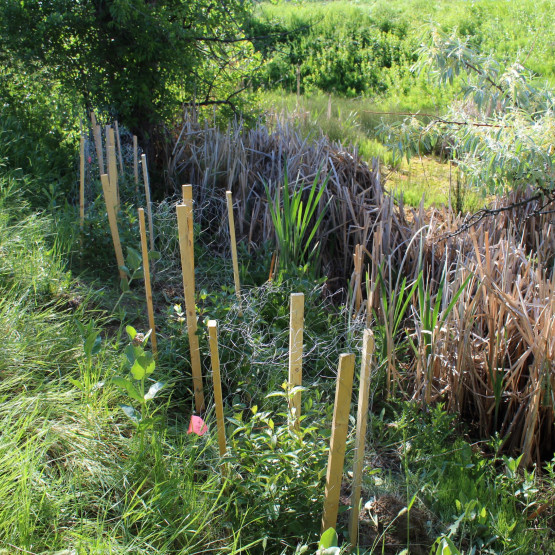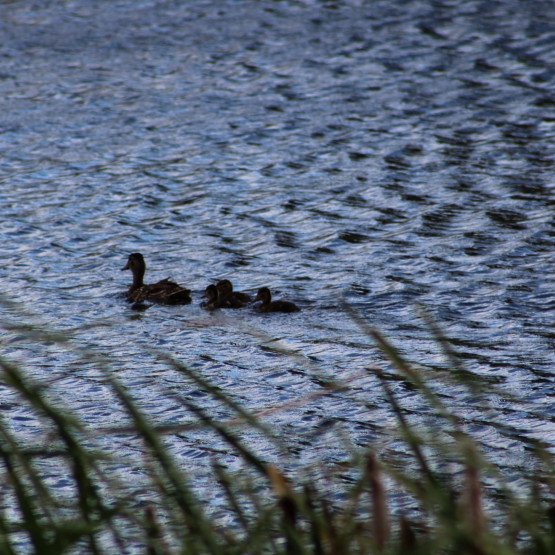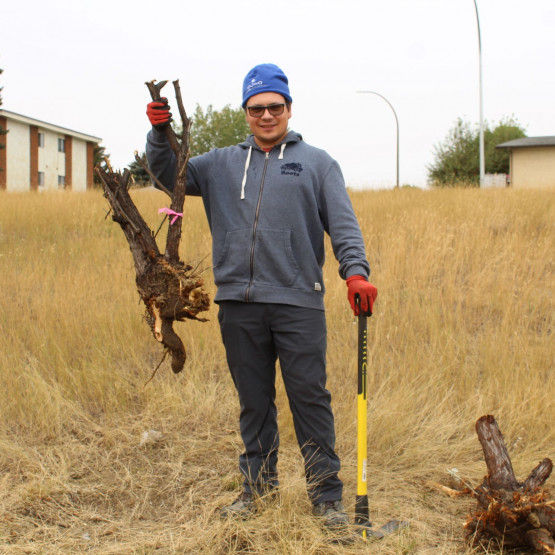Connaught Pond is one of SEAWA's most public sites. Its central location within Medicine Hat, and its proximity to Medicine Hat College make it a convenient place to show off riparian restoration. The project at Connaught pond is in partnership with the City of Medicine Hat, and is funded through Alberta Environment and Parks' Watershed Resiliency and Restoration Plan (WRRP), and Fisheries and Oceans Canada's Recreational Fisheries Conservation Partnerships Program (RFCPP).
The site was chosen for restoration in part due to its convenient location, but primarily because of the extent of invasion by Russian olive (Elaeagnus angustifolia) on site. Russian olive is an invasive species that is very prolific in Southern Alberta, and pushes out native vegetation such as cottonwoods and willows. At the Connaught Pond restoration site, Russian olive has practically pushed back all native trees from the shore, and completely taken over. Additionally, it can harbor the spread of other invasive species due to its ability to change soil conditions away from what is normal for the region. As of 2021, around 215 shrubs and trees have been planted at this site.

To compete with the Russian olive on site, and strengthen native plant communities, SEAWA has been revegetating with native shrubs and trees. The species used on this site include:
- Eastern cottonwood (Populus deltoides)
- Manitoba maple (Acer negundo)
- chokecherry (Prunus virginiana)
- Saskatoon (Amelanchier alnifolia)
- red osier dogwood (Cornus sericea)
- golden currant (Ribes aureum)
- wolf willow / silverberry (Elaeagnus commutata)
- thorny buffaloberry (Shepherdia argentea)

Applied Research: Browsing Prevention
In 2019, an experiment was started testing the differences in growth between cottonwood saplings with cages, versus those without. The experiment is being conducted on a small stand of young cottonwoods that appear to be shoots from a much older cottonwood that was previously felled by beavers.
Results for the first season of this experiment are available in our September 2019 newsletter.

Invasive Species Control
As part of the efforts at Connaught Pond, SEAWA has been conducting
experiments on control methods for Russian olive, and has concluded that
manual extraction, although arduous, is the most effective and safe
method of control.When compared with chemically killing the trees, cutting and removing the stumps was much more effective at preventing regrowth. In fact, several cut stems that had been treated with herbicide have shown regrowth in the time since treatment.
With this knowledge, SEAWA obtained permission from the City of Medicine Hat to begin cutting down small Russian olive trees, and extracting the stumps. This is ongoing, and will help to significantly reduce the amount of seed spread at this site.

In September 2020, another invasive species was brought to SEAWA's attention at the Connaught Pond site: bittersweet nightshade (Solanum dulcamara). It was found to be growing extensively along the north shore of the pond, particularly among Russian olives. Bittersweet nightshade is a vining plant, characterized by bright purple flowers, followed by bright red, tomato-like berries. It is poisonous, and very invasive. Since its discovery at Connaught Pond, SEAWA has documented its presence in several other areas of Medicine Hat. SEAWA has since started an experiment to test some control measures for bittersweet nightshade. Learn more about SEAWA's invasive species management here!
Challenges

Being an urban site introduces different challenges to those present in rural areas. Weeds and introduced species are practically unavoidable, and problems such as vandalism and littering have an impact as well. Additionally, animal activity is much more noticeable due to a lack of suitable vegetation making planted shrubs much more attractive to deer and beavers.
A particular challenge at the Connaught Pond site is disease in cottonwoods. Because many cottonwoods in Medicine Hat are prone to disease, it is easy for this to spread to SEAWA's trees. Disease is an issue that SEAWA has been dealing with for multiple seasons, and has caused some trees to require significant pruning in order to ensure their survival. This is not ideal, as it negates a lot of the plants' growth. In an attempt to slow this, SEAWA staff have begun using regular treatments of a homemade, eco-friendly fungicide on trees planted at this site, and have noticed positive results.

















